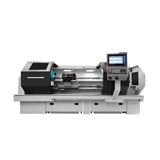There are many reasons for both small and large firms to do this, but first and foremost the reason is saving money. Almost all moves to reduce a firm's carbon output will also cut that firm's energy bill.
The New South Wales government recommends turning down air condition in summer; switching to energy efficient lighting; replacing old electrical hardware with new, more efficient models; and monitoring energy use carefully, to find out what appliances are the most power-hungry.
Educating staff to switch off machines, and to use them on their most energy efficient settings, will also help. Companies wishing to go further could look at working from home, and car-pooling initiatives to reduce the transport impact of people coming into work.
"We recommend people join our Sustainability Advantage Program which will help people identify and manage the risks of any upcoming environmental legislation as well as reduce costs," said a spokesman for the New South Wales government.
The first stage to reducing carbon is always careful metering. Even if businesses don't take immediate action on their carbon footprint, beginning to meter energy use accurately will be the first step towards reduction.
Both Victoria and New South Wales are currently rolling out smart meters for businesses, which measure energy use more accurately. Firms should contact their energy supplier for more information on how to get a smart meter installed.
Reducing carbon usage will also enhance the reputation of a business both as a supplier and as an employer, and could lead to winning more government contracts, which now expect sustainable practices as a condition of award.
And it's not just small firms who are taking action on carbon. The National Australia Bank has installed its own tri-generation plant, at a datacenter in Melbourne, in order to save nearly $1 million in annual power costs.
The move will see the bank effectively generating its own electricity, because it is cheaper and emits less carbon than getting that electricity from the National Grid.
"It's cleaner and cheaper than electricity from the grid, and we feel it's always good to get a jump on regulation if you know it's in the pipeline," said the bank's Glenn Allan, who oversaw the project.
Other than just saving on energy bills, there may be further financial incentive for businesses to act sooner rather than later. Firms that need to invest in new equipment or hardware could receive help form the government to get the capital to do so now.
The government has set up a Climate Change Action Fund to assist businesses who will face carbon regulation in the future.
Last year the government promised the fund would provide $1.4 billion over five years to assist small businesses and community groups with addressing climate change
Grants are on offer for the purchase of energy efficient equipment, with some funds available as grants for developing long-term energy efficiency plans.
More information can be found on the department of Climate Change and Energy Efficiency web site.



-160x160-state_article-rel-cat.png)

-160x160-state_article-rel-cat.png)

-160x160-state_article-rel-cat.png)


-160x160-state_article-rel-cat.png)








